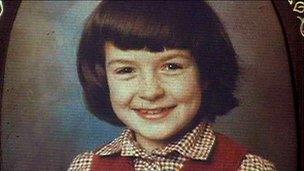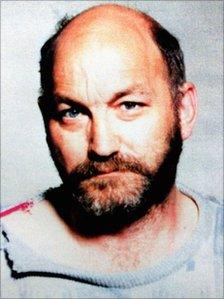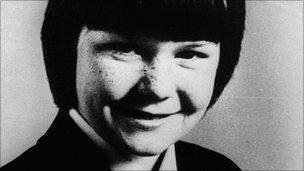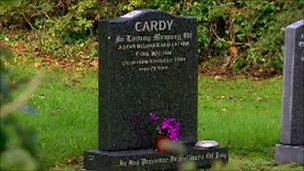Jennifer Cardy: A 30-year wait for justice
- Published

Jennifer's body was found at McKee's Dam near Hillsborough
The 1981 death of Jennifer Cardy remained unsolved for three decades, until now. As serial killer Robert Black starts a life sentence for murdering the nine-year-old, the BBC's Karen Atkinson looks back at his trail of terror - and at a senseless killing that had the power to shock, even in the darkest days of the Troubles.
It seemed like any other ordinary summer afternoon - 12 August 1981.
Jennifer Cardy was enjoying her school break and about to set off from home on her new red bicycle to visit a friend.
A cruel twist of fate meant she never arrived.
The nine-year-old's bike was later found dumped in a field not far from where her family lived in Ballinderry near Lisburn.
Her disappearance sparked one of the biggest searches in Northern Ireland, with police, the Army and hundreds of local volunteers getting involved.
Shock
One of them was the SDLP politician Dolores Kelly, who was a young student at the time.
"The whole community was stunned at the fact that a young child had, seemingly, disappeared off the face of the earth," she said.
"Volunteers went through all the fields and ditches and drains, but it was really soul-destroying that there was no sign of Jennifer. People really felt for the Cardy family."
Andrew and Patricia Cardy faced every parent's worst nightmare and made several appeals for their daughter's safe return, but that hope was shattered just six days after Jennifer went missing.
Her body was found by two duck hunters at McKee's Dam near Hillsborough on 18 August.
Robert Black had abducted, sexually assaulted and murdered the young girl.
At that time, the serial killer was a dispatch driver for a London-based poster company and often used the A1 - which is yards from the dam - for deliveries.
Funeral

The predatory paedophile has a long history of sexually abusing young girls
Black admitted being in Northern Ireland on the day that Jennifer went missing and petrol receipts, produced by the prosecution during his trial, proved that was the case.
The crowds who had scoured the fields for Jennifer also turned out for her funeral.
Reverend William Beattie was a friend of the Cardy family and officiated at the service.
"She was a lively and bright little girl - very well-mannered and behaved. She seemed to be an ideal daughter and was a real gem of a person," he said.
Jennifer Cardy was not the first, nor the last young girl attacked by Robert Black.
Born in Scotland, the 64-year-old was a predatory paedophile with a long history of sexually abusing young girls.
In 1963, when he was 16, he abused a seven-year-old girl in a disused air shelter near his then home in Greenock near Glasgow.
When he was 19, he was convicted of indecently assaulting the young daughter of the family he had been lodging with.
He killed again in 1982.
This time Susan Maxwell from the village of Cornhill-on-Tweed, close to the border between Scotland and England.
Grim discovery
Like Jennifer, Susan was sexually assaulted and her body dumped close to a lay-by.
A year later, Caroline Hogg disappeared from outside her home in the seaside resort of Portobello, just outside Edinburgh.
Ten days later, the five-year-old's body was found in a ditch in Leicestershire.
A third girl, 10-year-old Sarah Harper, was abducted as she walked from a corner shop near her home in Morley, Leeds.
She was murdered by Black and her body discovered in the River Trent in Nottingham.
The deaths sparked one of the biggest joint police investigations in British criminal history, with six forces involved, but still Black evaded capture.
It was not until 1990 that Black was caught in the act, when he abducted a six-year-old girl in the village of Stow in the Scottish borders.
Thanks to the vigilance of a member of the public, Black was stopped and the child rescued.
She was found hidden in a sleeping bag in the back of the killer's van.
The incident led police to Black, who was given a life sentence for the abduction, and in 1994 he was convicted of the murders of Susan, Caroline and Sarah.

Susan Maxwell was murdered by Black in 1982
For those who investigated Black's crimes - and had an insight into the mind of this serial killer - the picture painted is a chilling one.
"He (Black) was a co-operative individual in a sense, but very closed and very controlled. There was a coldness in his empty eyes," said Roger Orr, a retired detective chief superintendent with Lothian and Borders Police.
"In police interviews, any time we would close in on specific details, he would sit and stare at you for long periods of time, in complete silence.
Loss
"I believe I've come to know the man as well as anyone will know him - it's a continuing professional interest."
For the families of Black's victims, there is no escaping the legacy of hurt and loss that he has caused them.
Susan Maxwell's brother Tom was just three when she died and aged 14 when Black was convicted of her murder.
He said seeing the serial killer sent to prison did not bring the Maxwell family closure, and they still take each day as it comes.
"A few years ago, I remember my mum saying to me that she had gone through this period of immense hatred for Robert Black," he said.

Jennifer is buried in a cemetery close to her home
"Now though, he's nothing, we try not to think of him. All we think about is Susan and the good times we had with her, even if it was only for 11 years."
In a quiet and peaceful part of Ballinderry is the cemetery where Jennifer Cardy is buried.
If she had lived, Jennifer would have been almost 40, perhaps with a family of her own.
But Robert Black robbed her - and his other victims - of any future.
For that he is now paying the price.
- Published12 October 2011
- Published7 October 2011
- Published22 September 2011